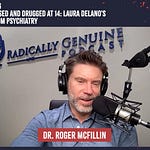Welcome to a landmark episode of the Radically Genuine Podcast! I'm thrilled to present our first full video episode, exclusively available to our valued paid subscribers. Your support has made this exciting new format possible, allowing us to bring you an enhanced, immersive experience of our thought-provoking conversations.
In this shocking episode, I interview Professor Ian Harris, an esteemed orthopedic surgeon and author of the book “Surgery, The Ultimate Placebo”. This conversation unravels the complexities of surgical outcomes, challenging conventional wisdom and highlighting the critical need for evidence-based practice in modern medicine.
Key points explored:
1. The placebo effect in surgery: We dissect how patient expectations and non-specific effects can significantly influence surgical outcomes, emphasizing the importance of distinguishing these from the procedure's direct physiological impacts.
2. Challenges in surgical research: We discuss the difficulties in conducting placebo-controlled surgical trials, shedding light on the methodological hurdles that complicate efforts to establish definitive evidence of surgical efficacy.
3. Surgeon bias and decision-making: The conversation explores the cognitive biases that can affect surgeons' judgments, potentially leading to unnecessary procedures or overestimation of benefits.
4. Overuse of surgical interventions: Harris presents compelling arguments about the prevalence of surgeries that may lack solid scientific backing, advocating for a more cautious approach to surgical recommendations.
5. Non-operative alternatives: The discussion highlights the often-overlooked potential of conservative treatments, particularly emphasizing the benefits of weight loss and exercise for conditions like knee arthritis.
6. Financial incentives in healthcare: We touch on the complex interplay between economic motivations and medical decision-making, exploring how these factors can influence treatment recommendations.
7. Placebo and nocebo effects: The conversation examines how both positive (placebo) and negative (nocebo) expectations can impact patient outcomes, underscoring the power of patient beliefs in the healing process.
8. Informed consent and patient education: We stress the importance of providing patients with accurate, evidence-based information to facilitate truly informed decision-making about their care.
This episode serves as a compelling call to action for increased scientific rigor in surgical practice and a more critical evaluation of established medical interventions. It challenges listeners to reconsider their assumptions about surgical efficacy and encourages a more nuanced understanding of the factors contributing to medical outcomes.











